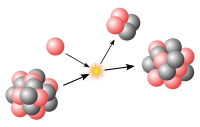
Back نويدة Arabic Нуклід Byelorussian Нуклид Bulgarian নিউক্লাইড Bengali/Bangla Nuklid BS Núclid Catalan ناوکید CKB Nuklid Czech Нуклид CV Nuklid Danish
| Nuclear physics |
|---|
 |
Nuclides (or nucleides, from nucleus, also known as nuclear species) are a class of atoms characterized by their number of protons, Z, their number of neutrons, N, and their nuclear energy state.[1]
The word nuclide was coined by the American nuclear physicist Truman P. Kohman in 1947.[2][3] Kohman defined nuclide as a "species of atom characterized by the constitution of its nucleus" containing a certain number of neutrons and protons. The term thus originally focused on the nucleus.
- ^ IUPAC (1997). "Nuclide". In A. D. McNaught; A. Wilkinson (eds.). Compendium of Chemical Terminology. Blackwell Scientific Publications. doi:10.1351/goldbook.N04257. ISBN 978-0-632-01765-2.
- ^ Kohman, Truman P. (1947). "Proposed New Word: Nuclide". American Journal of Physics. 15 (4): 356–7. Bibcode:1947AmJPh..15..356K. doi:10.1119/1.1990965.
- ^ Belko, Mark (1 May 2010). "Obituary: Truman P. Kohman / Chemistry professor with eyes always on stars". Pittsburgh Post-Gazette. Archived from the original on 14 December 2019. Retrieved 29 April 2018.